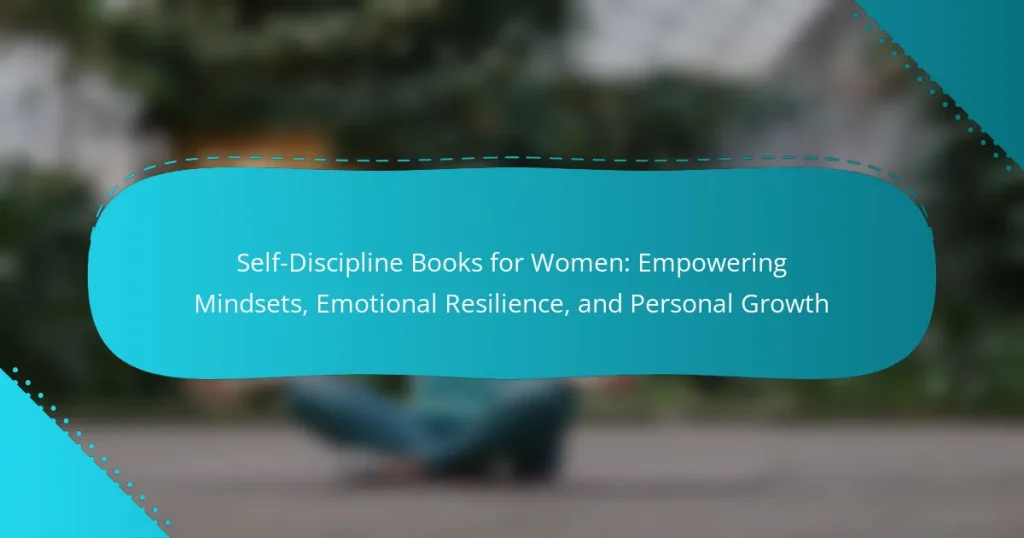Self-discipline is crucial for women seeking empowerment and personal growth. This article explores self-discipline books that enhance emotional resilience, provide actionable strategies, and promote continuous self-improvement. Discover practical exercises and real-life examples that emphasize community support and accountability in your journey toward a stronger mindset.

What are the key themes in self-discipline literature for women?
Self-discipline literature for women emphasizes key themes like empowerment, emotional resilience, and personal growth. These themes help women cultivate a strong mindset and overcome challenges.
Empowerment is often highlighted as a unique attribute, encouraging women to take control of their lives through actionable strategies. Emotional resilience is a root attribute, teaching women to manage stress and setbacks effectively. Personal growth is a rare attribute, focusing on continuous self-improvement and goal setting.
Books in this genre frequently share practical exercises and real-life examples, reinforcing the importance of community support and accountability. The integration of these themes promotes a holistic approach to self-discipline, fostering a transformative journey for women.
How do self-discipline books empower women?
Self-discipline books empower women by fostering strong mindsets, enhancing emotional resilience, and promoting personal growth. These books provide practical strategies and insights that help women overcome challenges and achieve their goals.
Many self-discipline books emphasize the importance of setting clear objectives and maintaining focus. For instance, books like “The Power of Habit” by Charles Duhigg illustrate how habits can be transformed, empowering women to take control of their lives.
Additionally, these books often include relatable stories and examples of successful women, which can inspire readers. This unique attribute of representation reinforces the belief that self-discipline is attainable and beneficial.
As a result, women who engage with these resources often report increased confidence and motivation, leading to significant personal and professional advancements.
What role does emotional resilience play in personal growth?
Emotional resilience is crucial for personal growth as it enables individuals to navigate challenges effectively. It fosters adaptability, allowing women to embrace change and develop a growth mindset. This mindset is often reinforced through self-discipline books, which provide strategies for building emotional strength. As a result, readers can cultivate a deeper understanding of themselves, leading to enhanced personal development and well-being. Emotional resilience also encourages perseverance, empowering women to pursue their goals despite setbacks.
What techniques enhance emotional resilience?
Practicing mindfulness, setting clear goals, and developing a growth mindset enhance emotional resilience. These techniques empower women to manage stress effectively and cultivate personal growth. Mindfulness helps in recognizing emotions without judgment, while goal setting provides direction. A growth mindset fosters adaptability and learning from challenges.
What are the unique attributes of self-discipline books for women?
Self-discipline books for women uniquely focus on empowerment, emotional resilience, and personal growth. They often feature relatable narratives, practical exercises, and tailored strategies that resonate with women’s experiences. These books emphasize community support and self-compassion, fostering a nurturing environment for personal development. Unique attributes include a focus on overcoming societal pressures and promoting holistic well-being.
How do these books address gender-specific challenges?
Self-discipline books for women address gender-specific challenges by focusing on unique societal pressures and emotional resilience. These books often highlight the importance of self-advocacy, helping women navigate workplace dynamics and personal relationships. They provide strategies for overcoming self-doubt, which is frequently exacerbated by gender norms. Additionally, these resources emphasize community support, encouraging women to build networks that foster empowerment and growth. By addressing these specific challenges, the books empower women to cultivate a mindset geared toward personal success and emotional well-being.
What are the common writing styles and formats?
Self-discipline books for women often employ various writing styles and formats to convey empowering messages. Common styles include narrative, which tells personal stories, and instructional, which offers practical advice. Formats range from self-help guides to workbooks that encourage reflection and action. These books typically focus on attributes like emotional resilience, mindset shifts, and personal growth strategies. Notable examples include structured exercises and motivational quotes that enhance engagement and retention of concepts.
What are the universal benefits of self-discipline books?
Self-discipline books for women provide universal benefits such as enhanced focus, improved emotional resilience, and personal growth. These books empower readers to cultivate a disciplined mindset, leading to better decision-making and goal achievement. Additionally, they often include practical strategies and relatable examples that resonate with women’s experiences, fostering a sense of community and shared learning. As a result, readers develop stronger self-control and motivation, essential for overcoming challenges and pursuing aspirations.
How can these books improve mental health?
Self-discipline books for women can significantly enhance mental health by fostering emotional resilience and promoting personal growth. These books offer practical strategies for managing stress and anxiety, enabling women to develop healthier coping mechanisms.
By instilling a strong mindset, readers can cultivate self-awareness and improve their decision-making skills. This empowerment leads to increased confidence and a greater sense of control over one’s life, contributing to overall well-being.
Additionally, self-discipline books often provide insights into establishing routines and setting achievable goals. This structured approach can reduce feelings of overwhelm and enhance productivity, further supporting mental health improvement.
Ultimately, the benefits of these books extend beyond personal growth, as they encourage a supportive community among women, fostering connections that can alleviate loneliness and promote shared experiences.
What skills can be developed through reading?
Reading self-discipline books can enhance skills like emotional resilience, focus, and personal growth. These books empower women by providing strategies for overcoming challenges and fostering a growth mindset. Developing self-discipline through reading leads to improved time management, better decision-making, and increased motivation. As a result, readers can cultivate a stronger sense of purpose and achieve their personal goals effectively.
What rare insights can be gained from selected authors?
Selected authors provide unique insights into self-discipline, focusing on emotional resilience and personal growth for women. Their perspectives often highlight the importance of mindset shifts, practical strategies, and overcoming societal barriers. For instance, authors like Brené Brown emphasize vulnerability as a strength, fostering deeper emotional resilience. In contrast, Angela Duckworth’s research on grit showcases the value of persistence in achieving personal goals. These rare insights empower women to cultivate self-discipline through understanding their emotions and motivations, ultimately leading to transformative personal growth.
Which authors are considered thought leaders in this niche?
Brené Brown, Mel Robbins, and Carol S. Dweck are thought leaders in self-discipline literature for women. Their works focus on empowering mindsets, emotional resilience, and personal growth. Brené Brown emphasizes vulnerability and courage, while Mel Robbins offers practical strategies for motivation. Carol S. Dweck introduces the concept of a growth mindset, essential for personal development. These authors provide valuable insights that resonate with women seeking to enhance their self-discipline.
How can readers apply the lessons from these books in daily life?
Readers can apply lessons from self-discipline books by incorporating daily habits that foster emotional resilience and personal growth. Start by setting clear, achievable goals to enhance focus. Utilize techniques such as journaling to reflect on progress and challenges. Engage in mindfulness practices to cultivate awareness and manage stress. Establish a supportive community for accountability and motivation. Regularly review and adjust strategies to align with evolving personal objectives.
What are some practical exercises to implement self-discipline?
To implement self-discipline, practical exercises include setting clear goals, creating a structured daily routine, and practicing mindfulness techniques. These strategies foster emotional resilience and empower personal growth.
1. Set specific, measurable goals to track progress.
2. Develop a consistent daily schedule to establish habits.
3. Use mindfulness meditation to enhance focus and reduce distractions.
4. Practice self-reflection to assess strengths and weaknesses.
5. Engage in physical exercise to improve mental discipline.
6. Limit distractions by creating a dedicated workspace.
How can accountability partners enhance the learning experience?
Accountability partners enhance the learning experience by providing motivation and support. They encourage goal-setting, foster commitment, and promote emotional resilience. This dynamic aligns with themes in self-discipline books for women, emphasizing personal growth through shared accountability. Studies show that individuals with accountability partners are more likely to achieve their objectives, reinforcing the value of collaboration in personal development.
What common mistakes should readers avoid when pursuing self-discipline?
Readers should avoid common mistakes like setting unrealistic goals, neglecting self-care, and seeking instant results. These pitfalls can hinder progress in self-discipline. Instead, focus on gradual changes, prioritize mental health, and celebrate small victories. Acknowledging these aspects fosters emotional resilience and supports personal growth.
What are the best practices for integrating lessons into a routine?
To effectively integrate lessons into a routine, prioritize consistency and reflection. Establish a specific time for learning, such as morning or evening, to create a habit. Utilize self-discipline books for women that focus on empowering mindsets and emotional resilience. These resources provide strategies for personal growth and can enhance motivation. Track progress and adjust your routine as needed to maintain engagement and effectiveness.




